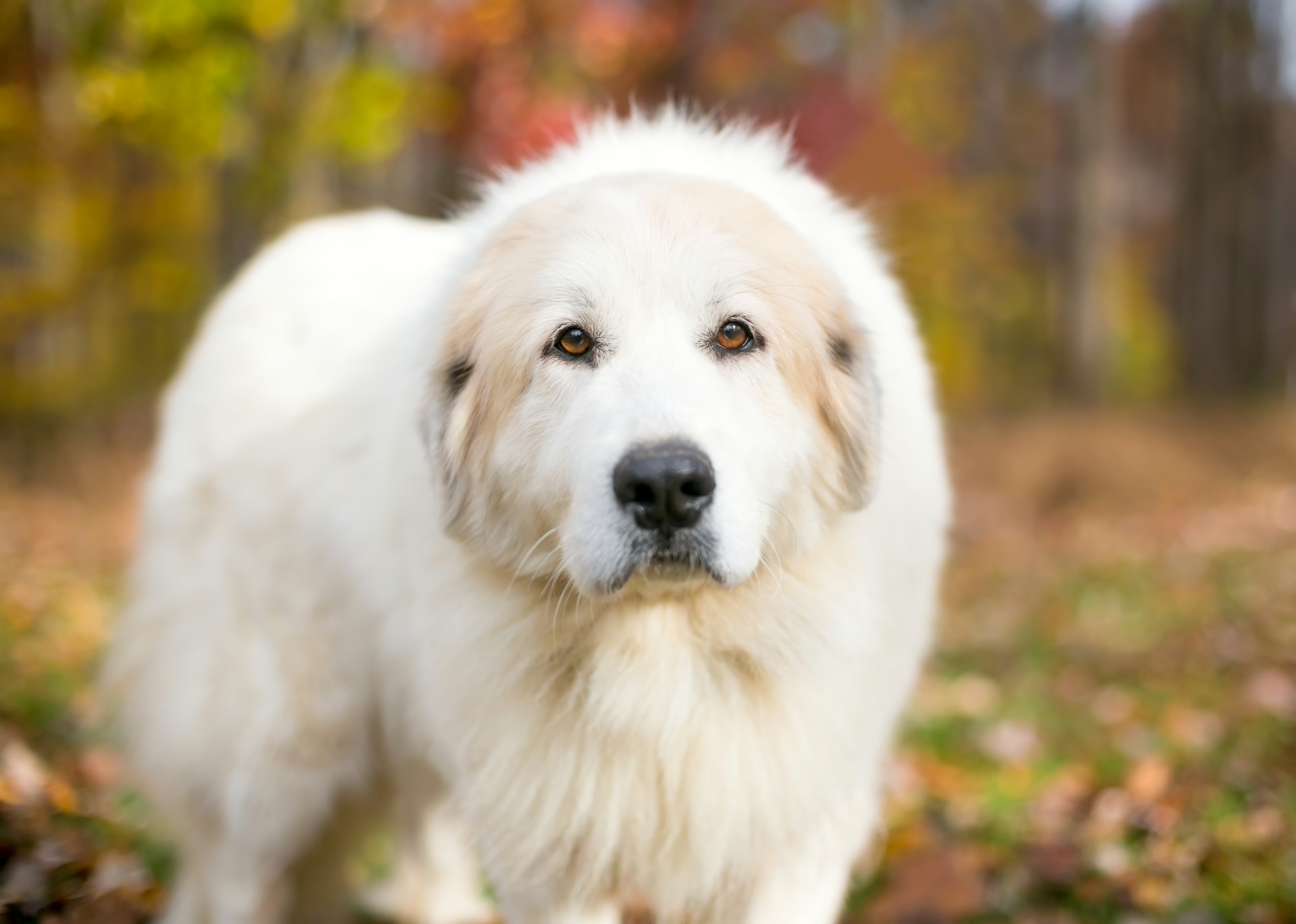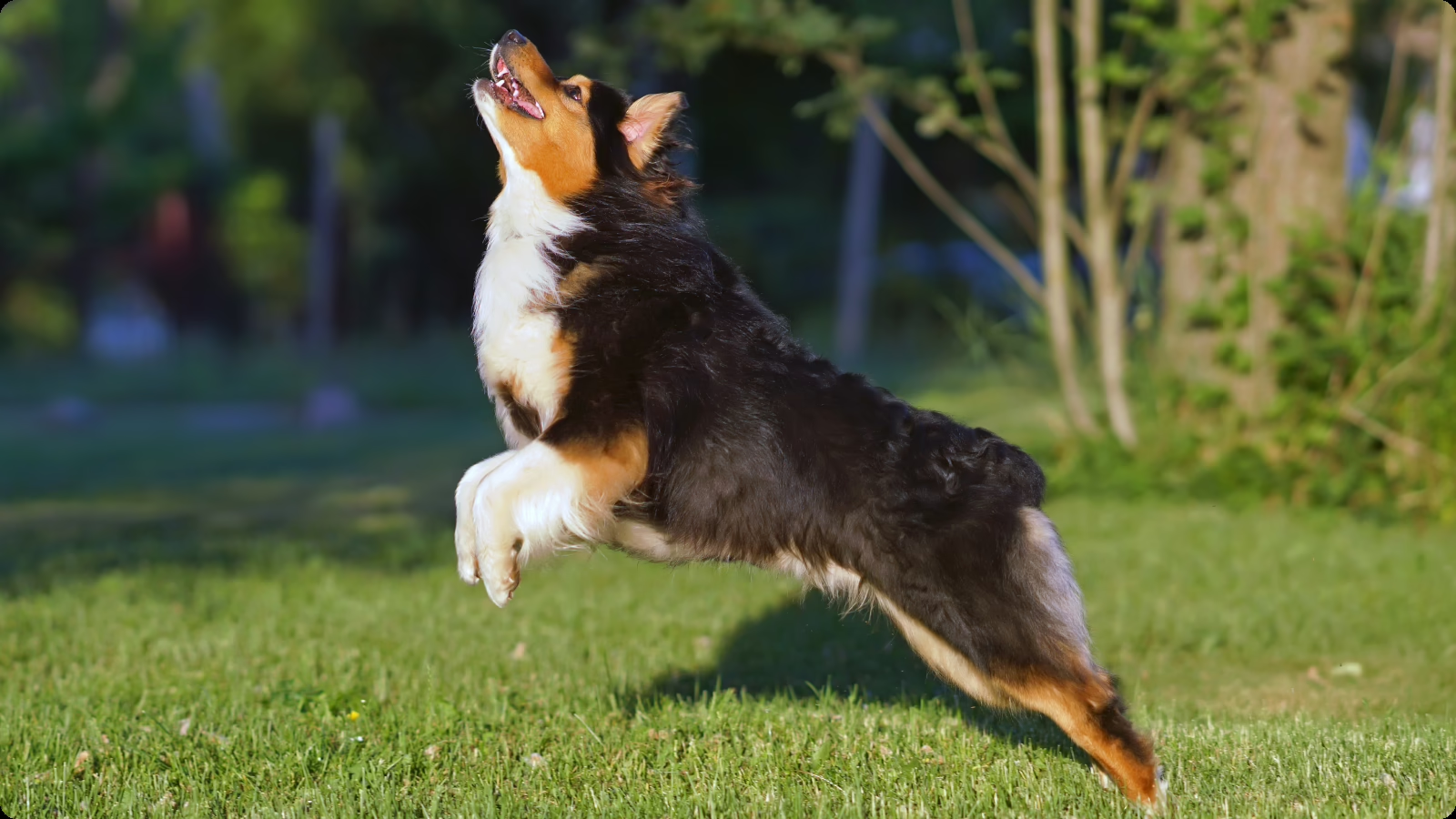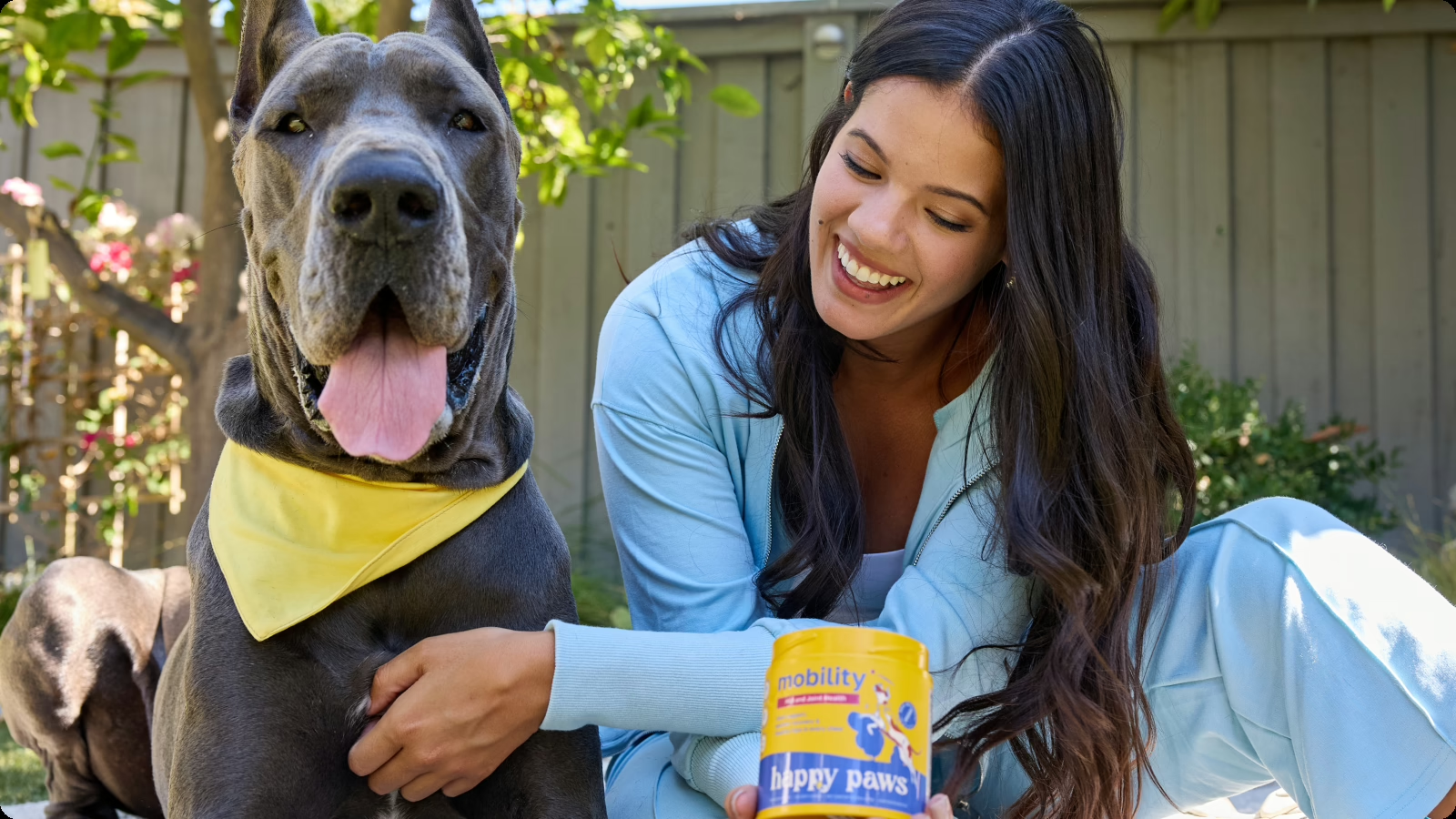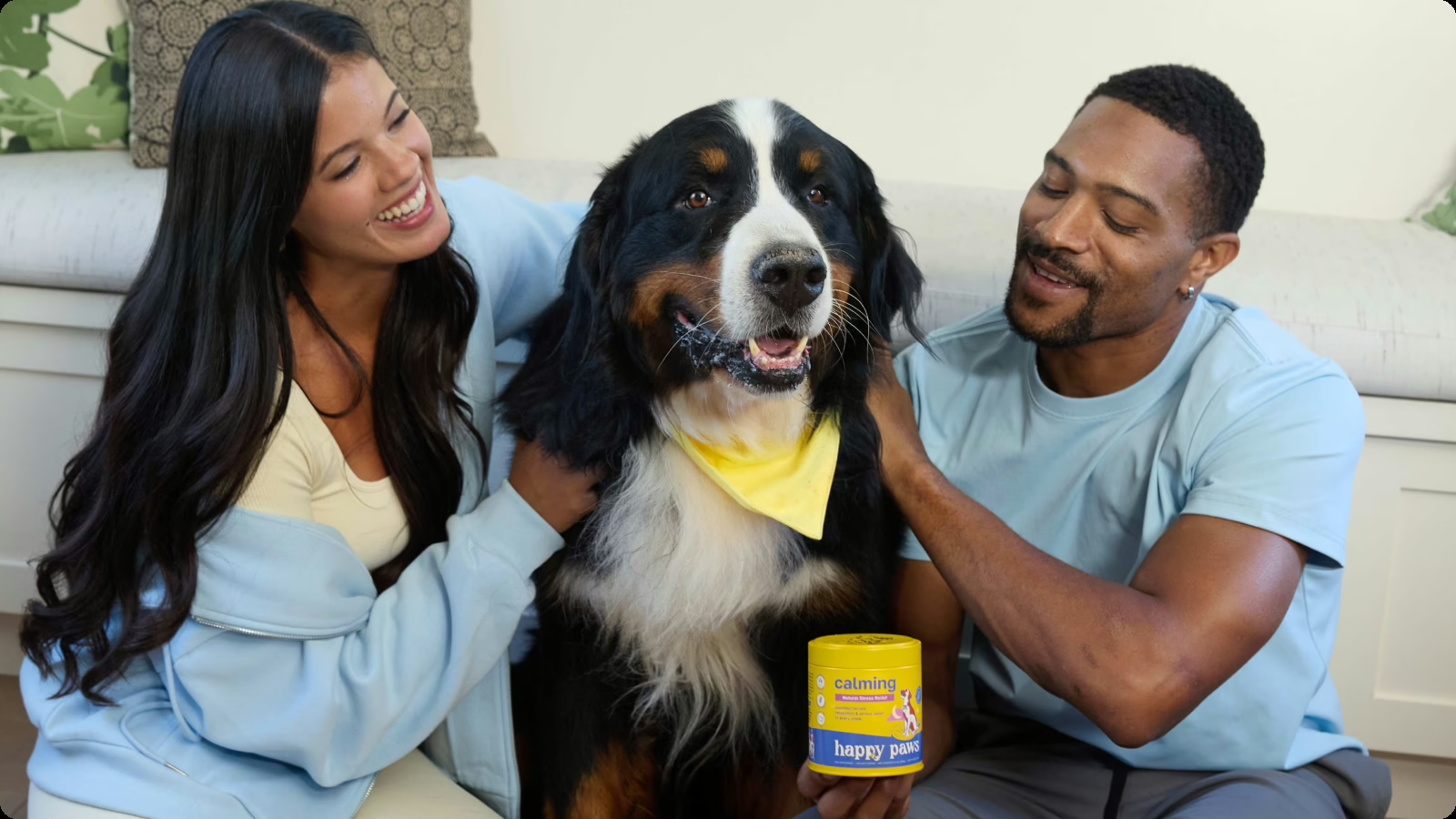The Fearless Furball
Calm, cool, confident furballs, the Great Pyrenees come from a long line of working dogs tucked away in the mountains between France and Spain. Here, they looked after livestock, warded off predators, and made friends with ranchers, families, and anyone who passed by. At their core (beneath all that fur), Great Pyrenees, Pyrs for short, are docile, smart, patient dogs with an endless tank of joy to give. That is, until danger encroaches. Then, you’ll see why ranchers still employ this dog to go toe-to-toe with wolves, coyotes, and even bears.
At Happy Paws, we’re dedicated to helping all dogs, from purebreds to certified mutts, live their happiest, healthiest lives. We’ve designed our dog supplements to target a range of trouble spots in your dog’s health—many of which include common issues for a Great Pyrenees dog.
In this article, we’ll dive into the history of the gentle observer, give you some information and tips on how to care for them, and help you decide which supplements are best for your extra-large fur baby, the Great Pyrenees.
Quick Facts
Origin: France & Spain
Size: Extra large
Breed Group: Working
Lifespan: 10–12 years
Coat: Long hair—weekly grooming recommended
Temperament: Calm, confident, independent, and a tad stubborn
Exercise Needs: When given the space, Great Pyrenees dogs love to wander, roam, and explore. They’re not much for running, unless the situation calls for it. They love accompanying their humans on hikes, walks, or strolls; just make sure to do so during cool hours. Their coat is not suited for high-intensity exercise in high temperatures.
Training: Great Pyrenees gravitate toward training, though they can have a certain independence they never quite shake. These dogs aren’t suited for agility or acrobatic training. Rather, their instincts pair perfectly with watchdog duties.
Dog Health: Typically, a Great Pyrenees can thrive on a traditional kibble-based diet. Common problems the Great Pyrenees face include hip dysplasia, skin and coat issues, and digestive problems. We’ll discuss how to address each below.
Happy Paws for Pyrs
Enrich your Great Pyrenees’ health with high-quality, tasty supplements like these!
| Type of Happy Paws Supplement | Best for … |
| Skin & Coat Dog Chews | Strengthening your dog’s coat & dermal health. |
| Digestive Health Dog Chews | Supporting healthy digestion and a strong gut flora. |
| 10-in-1 Multivitamin Dog Chews | Giving your pupper a daily dose of essential vitamins, minerals & other nutrients. |
| Bladder Health Dog Chews | Relieve symptoms of poor bladder health, like incontinence, frequent urination, and more. |
| Hip & Joint Dog Chews | Soothing common symptoms of joint dysplasia & inflammation. |
In-Depth Look at Popular Supplements
Our high-quality, tail-waggin’ dog supplements use an array of all-natural, organic ingredients to enrich your pet Pyrenees’ health, while satisfying their taste buds. Here are a few dog supplements to help you care for your Pyr.
Skin & Coat Dog Chews: Our Skin & Coat Dog Chews help keep the sheen in your dog’s glow. These vegan, chicken-flavored soft chews use a blend of skin-supporting ingredients, like biotin and coconut oil, to restore dermal health and replenish your dog’s coat.
Digestive Health Dog Chews: Our Digestive Health Dog Chews use powerful, all-natural probiotics and enzymes to enrich your dog’s gut health and strengthen their digestive system. These healthy, tasty dog treats offer a delicious pumpkin flavor that spoils your pet’s palate while fortifying their gut flora.
10-in-1 Multivitamin Dog Chews: Our 10-in-1 Multivitamin Dog Chews use multiple essential nutrients to sharpen your dog’s daily health and give them a well-rounded supplement. One vegan, lamb-flavored dog treat introduces ten key nutrients to keep your Great Pyrenees healthy, happy, and active.
Bladder Health Dog Chews: Our Bladder Health Dog Chews contain powerful antioxidants, including cranberries and Kona berries, to help calm common urinary issues such as incontinence, frequent urination, and urinary tract infections (UTIs).
Hip & Joint Dog Chews: Soothe the symptoms of joint dysplasia with our Hip & Joint Dog Chews! Packed with a blend of joint-friendly ingredients, this dog supplement helps reduce inflammation and support joint health, thanks to compounds like glucosamine, chondroitin, and hyaluronic acid.
Common Great Pyrenees Health Concerns
Like other giant dog breeds, Great Pyrenees dogs are often prone to common health issues like these:
Elbow & Hip Dysplasia: According to the American Kennel Club (AKC), many medium-sized to extra-large dog breeds are susceptible to elbow and hip dysplasia. This issue arises from birth when the bone in a joint is misshapen, causing an awkward fit in your dog’s joints. This defect can often lead to joint pain, osteoarthritis, limping, and trouble standing up.
Digestive Issues: Large to giant breeds are commonly prone to digestive problems, like bloating. These issues can stem from their diet, lifestyle, or genetics.
Allergies: Your Pyrr can have an overactive immune system, leading to a number of common allergies. Plus, with their double-layered coat, these allergies can snowball into several types of dermal dilemmas. Signs that your dog has allergies include frequent skin infections, fur loss, constant licking, itching, scratching, or red, inflamed skin.
About the Breed
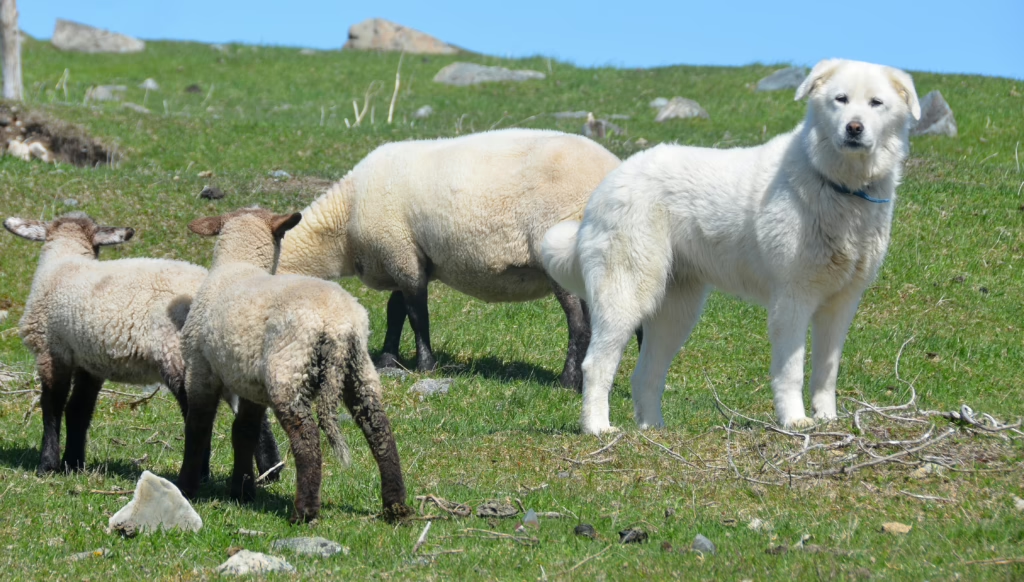
Straddling the border between France and Spain, the Pyrenees Mountains separate the Iberian Peninsula from the rest of Europe, reaching elevations of 3,400 meters and spanning around 430 kilometers. Here, in this desolate mountain range, one breed made a name for itself, thanks to its innate protective instincts, unyielding courage, and iconic, double-layered mane.
The Great Pyrenees is an extra-large, working dog breed that’s been assisting farmers in this region for thousands of years. With their large, double-layered coat, the Great Pyrenees can withstand the harsh climates at this altitude. Thanks to their low energy and independent nature, they could sit and watch the livestock graze for hours on end. If danger ventured into their domain, the Great Pyrenees was known to fend off predators and even go toe-to-toe with animals twice its size.
Today, after facing dwindling numbers following World War II, the Great Pyrenees breed has made a remarkable comeback, with only around 10% of the population being used as working dogs. Many families have added Pyrs as pets, allowing this big, lovable fluffball to lounge on their couch and roam their lawns.
Their Temperament
While docile, courageous, and confident, the Great Pyrenees has a peculiar quirk: they’re mostly nocturnal. Bred to watch over livestock, the Great Pyrenees used to do most of its work at night, patrolling hills and mountainous landscape while its humans slept. This trait has passed down to home-bound Pyrenees, too. You may find your Pyr walking around your home most nights, keeping a watchful eye on the windows and doors, protecting what they love most: you!
A Simple Care Guide
Since they are massively independent (and just massive in general), Great Pyrenees are like a life-sized teddy bear, waiting for pets and pats. They don’t have an endless battery, nor do they have a laundry list of special care instructions—looking at you, French Bulldog.
But there are a few things you’ll need to keep in mind when owning and caring for a Great Pyrenees. Here are a few tips to help keep your Pyr happy, healthy, and lively, from their puppy years and well into their golden years.
Weekly Coat Maintenance
Like many other mountain-bred dogs, the Great Pyrenees has a unique, double-layered coat that sheds in the spring and blossoms in autumn. This can result in numerous tufts of fur scattered throughout your home, year-round. You may need to carve out time each week to brush through your Pyr’s coat, all the way to the undercoat. This can help pull out dirt, debris, and gunk. Semi-monthly baths might also be needed, depending on your Pyr’s daily activities.
Space to Roam
All dogs, including Pyrs, need exercise, but they don’t require lengthy runs or special agility training. They are more gravitated toward grazing and roaming. They saunter instead of sprint. A few leisurely walks during the day will do. But just make sure to do these during the coolest parts of the day.
Early Socialization
When your Pyrenees is young, introduce them to well-behaved dogs. This breed tends to love all creatures, and early socialization can help reinforce their confidence and courage. Also, take your dog to meet new people, explore new places, and experience new scents. All this can help build your Pyr into a calm, confident pup.
Venture Into the Great Outdoors
Whether you’re out on a hike or nature stroll, take your Pyrs with. These dogs love to get outside and explore. And make sure to go at their speed. These dogs walk leisurely, unless faced with encroaching danger. Then, they flip into sport mode and guard their loved ones.
High-Quality Dog Supplements for Great Pyrenees
Keeping your pup happy, healthy, and active shouldn’t feel like a full-time job. At Happy Paws, we’ve designed our dog treats with the best ingredients and flavors possible (our dogs definitely approve!). We’ve ensured that these treats are certified organic, non-GMO, and third-party tested for purity, allowing you to spoil your Great Pyrenees with healthy, tasty dog treats.
FAQ
Is a Great Pyrenees a good family dog?
Yes, Great Pyrenees can be a wonderful family dog. They have a great disposition around well-behaved children and other dogs. Plus, they don’t have an endless battery. So, they can lounge around with you. But these dogs are behemoths. They need a lot of space to graze. While they can thrive in apartment life, they do best in homes with some space to roam.
Are Great Pyrenees dogs high maintenance?
In terms of their temperament, Great Pyrenees are low maintenance. These dogs tend to be a little independent and confident when left alone. That said, their coat can be trouble for even the strongest vacuums. Plus, you’ll need to brush their coat a few times a week to make sure it stays clean.
Does a Great Pyrenees dog bark a lot?
Yes, Great Pyrenees tend to bark at just about anything. That’s their way of alerting you to any danger, like the mailman, the ice maker, or the dreaded squirrel in the backyard.
How do you give Great Pyrenees dogs health supplements?
You can give your dog a Happy Paws health supplement in several ways. First, we’ve designed these supplements as dog treats, so you can give them to your pupper as a reward for good behavior. Or, you can add it to your dog’s kibble; they make a pretty tasty topper, too.
